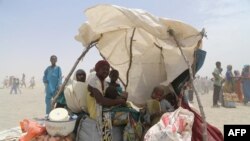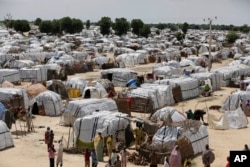A U.N Security Council delegation visiting Chad and Niger expressed support Saturday for countries in West Africa that are battling Boko Haram and coping with the humanitarian fallout from the war on terror.
Boko Haram terrorists are threatening territory in both Chad and Niger and are launching attacks on their populations and militaries. Just two weeks ago, Niger lost 16 soldiers in an attack by the group in the north of the country.
Chad's Prime Minister Albert Pahimi Padacke told VOA that terrorism could not be defeated solely by military means. Development is necessary, he said, so that the people will not listen only to the extremists.
This strategy was echoed by Niger's President Mahamadou Issoufou, who said his country needed better infrastructure, education, health care and jobs for its youth. He told the visiting Security Council ambassadors that "social and economic development promote democracy."
Chad and Niger are both at the very bottom of the U.N. Development Index. In addition to struggling with extreme poverty, they are coping with severe humanitarian crises, trying to feed and shelter hundreds of thousands of displaced persons and refugees who have fled Boko Haram's reign of terror, as well violence in Libya, Mali and the Central African Republic.
British Ambassador Matthew Rycroft, who is co-leading the Security Council's visit, acknowledged the need for a holistic approach in dealing with the effects of the crisis.
"We have come to understand more deeply the root causes of all of these crises," Rycroft said. "You cannot tackle terrorism without also tackling poverty; you cannot tackle terrorism without thinking about education, employment, social development, agriculture, human rights, the role of women and children in society, refugees and so much more."
A Multinational Joint Task Force made up of countries from the Lake Chad Basin — Cameroon, Chad, Niger, Nigeria and Benin — has about 10,000 troops on the ground working to end the threat of Boko Haram.
The council visited the task force headquarters in N'Djamena on Saturday, where they were told the terrorist group had been "substantially degraded" and pushed out of many of its strongholds to the hundreds of islands that dot Lake Chad.
The task force said it had killed about 828 Boko Haram fighters since January 2016 and had arrested more than 600 others. The force has also destroyed 32 Boko Haram camps.
But as these two countries continue to spend heavily on containing security threats, development continues to suffer.






